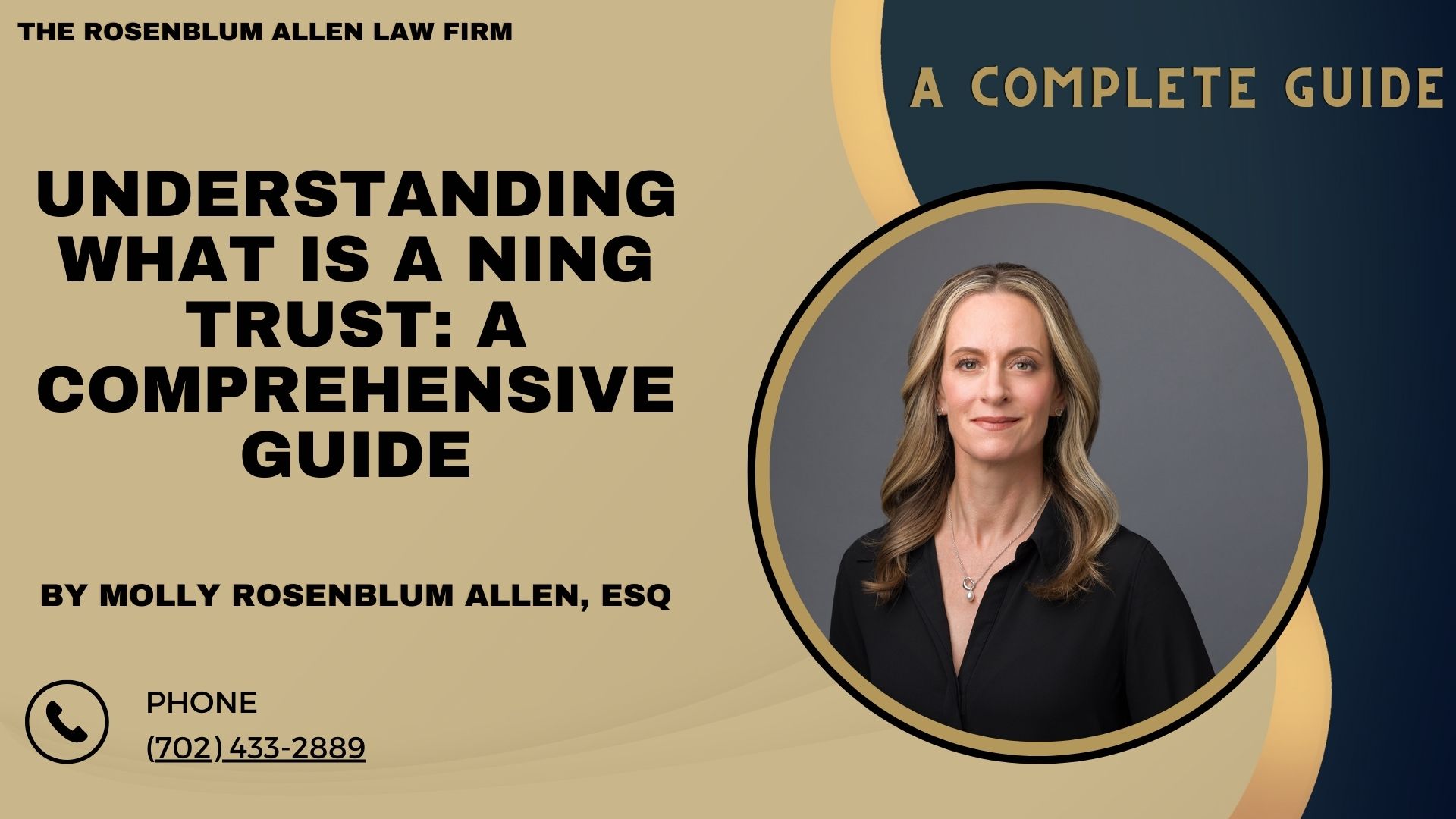When diving into estate planning, you may be learning a new language. The world of finance has many acronyms and jargon. “NING Trust” stands out. It is potentially beneficial but seems shrouded in mystery.
The trust is designed to offer big tax breaks and protect assets.
The trust aims to provide large tax breaks. It also aims to safeguard assets.
Understanding what a NING Trust is and how it works could change your financial strategy.
Note: Make sure to also check out our Protect your Family Trust post while you’re here
Overview of NING Trusts
At its core, a NING Trust is an estate planning tool. People can cut their taxes while ensuring they keep and manage their assets as they want. The name “NING” stands for Nevada Incomplete Non-Grantor Trust. It shows its ties to laws that make such a trust possible and good.
Importance of NING Trusts in Estate Planning
Estate planning is about preparing for the future. It ensures your assets go to your wishes. Ideally, it also minimizes the tax on your beneficiaries. Trusts enter the picture as a powerful vehicle to achieve these goals. They are especially useful for residents of high-income tax states. They also help those seeking to optimize their estate’s tax situation.

Definition of NING Trust
To understand the NING Trust, start by breaking down its name. Then, consider its place in estate planning.
Explaining the Term “NING Trust”
A NING Trust is an irrevocable trust. It is set up to use specific state laws. These laws allow for the avoidance of state income taxes on some trust income. It’s “incomplete” because the grantor gives up some control. They set up the trust and put in the assets. But, they do not give up enough control for it to count as a complete transfer for federal gift tax purposes.
The Acronym: What NING Stands For
N: Nevada – This indicates the trust is established under the laws of Nevada, which offers favorable tax and trust laws.
I: Incomplete – Refers to the grantor not wholly giving up ownership for gift tax purposes.
N: Non-Grantor – The trust is considered a separate tax entity from the grantor, meaning it’s responsible for its taxes.
G: Trust – A fiduciary arrangement that allows a third party, or trustee, to hold assets on behalf of a beneficiary or beneficiaries.

History and Origin of NING Trusts
The idea of NING Trusts isn’t new. But, they’re more popular as more people seek ways to cut their taxes.
Development of NING Trusts in Estate Planning
In response to the need for better estate planning tools, developers created them. The tools had to offer asset protection and tax efficiency. Their evolution is closely tied to changes in federal and state tax laws. This makes them a relatively modern tool in the estate planner’s toolkit.
Legal Evolution and Recognition
The legal basis for NING Trusts comes from state laws. The laws give trusts favorable tax treatment. Over time, these trusts have faced legal challenges and IRS scrutiny. These tests refined the trusts. They led to today’s understanding and use of NING Trusts in estate planning.

How NING Trusts Work
To grasp the value of a NING Trust, you must understand its structure and how it works. Let’s dive into the mechanics of how these trusts work.
The Structure of a NING Trust
The design of a NING Trust is crucial. It helps you use the tax advantages and asset protections it’s meant to provide.
Trustor, Trustee, and Beneficiaries Roles
Trustor: Also known as the grantor, the trustor is the person who creates the trust and transfers assets into it.
Trustee: The individual or entity responsible for managing the trust and its assets. Nevada law requires at least one trustee to be a resident of Nevada or a Nevada-based entity.
Beneficiaries: These are the individuals or entities that the trust benefits. They can be anyone the trustor chooses, including family members or charities.
Establishment Process
Choose a Trustee: Selecting a qualified trustee is the first step. This can be a Nevada-based individual or trust company.
Draft and Sign the Trust Agreement: This document outlines the trust’s terms, including its purpose, who the beneficiaries are, and how assets should be managed and distributed.
Transfer Assets: The trustor must transfer assets into the trust, which may involve retitling assets in the name of the trust.
Funding a NING Trust
The assets you place in a NING Trust can significantly impact its effectiveness.
Types of Assets Suitable for a NING Trust
Investment Accounts
Real Estate
Business Interests
Transfer and Titling of Assets
Assets must go to the trust and be titled in its name. This requires careful attention to get the trust’s tax benefits.
Managing a NING Trust
Once set up and funded, managing a NING Trust involves oversight by the trustee. They must make strategic decisions to maximize benefits.
Trustee Responsibilities and Powers
Investing Trust Assets: Making decisions on investing and managing the trust’s assets.
Distributions: Deciding when and how much to distribute to beneficiaries based on the trust agreement and their needs.
Tax Filings: Ensuring the trust complies with tax reporting requirements.
Investment and Distribution Strategies
The trustee must balance the need for growth. But, they must also provide for the beneficiaries. They must also consider the tax effects of their decisions.

Tax Implications and Benefits
One of the best things about NING Trusts is their tax benefits. But, you need a deep dive to fully appreciate them.
Federal Tax Considerations
NING Trusts aim to be tax-efficient. They are especially so for federal taxes.
Income Tax Advantages
Separate Tax Entity: NING Trusts pay their income taxes at trust tax rates, which can offer savings depending on the trust’s income and the grantor’s personal tax situation.
Avoidance of State Income Tax: For income generated within the trust, many states’ income taxes can be avoided if properly structured.
Estate and Gift Tax Implications
Incomplete Gift: Since the trust is an “incomplete gift,” the assets transferred to the trust are not subject to federal gift tax upon transfer.
State Tax Considerations
The primary allure of a NING Trust is often its ability to sidestep state income taxes.
Avoidance of State Income Tax
Assets held in a NING Trust may generate untaxed income. This is if the trust is properly set up and run in a state like Nevada. Nevada has no state income tax.
States Where NING Trusts Are Most Beneficial
Residents of states with high tax rates benefit most. They benefit from setting up a NING Trust. This includes states like California, New York, and New Jersey.

Legal Requirements and Considerations
Establishing a NING Trust is not a “set it and forget it” process. It requires adherence to legal requirements and ongoing consideration of compliance and reporting.
Establishing a NING Trust
Creating a NING Trust involves many legal steps. They aim to ensure it meets all needed criteria.
Necessary Legal Documents
Trust Agreement: The foundational document outlining the trust’s terms.
Transfer Documents: Legal documents are required to move assets into the trust.
Jurisdictional Requirements
Selecting a place like Nevada is critical. It has favorable trust laws and no state income tax.
Compliance and Reporting
Maintaining a NING Trust requires ongoing attention. It must follow both state and federal rules.
IRS Requirements
You must file taxes and follow IRS trust rules. The trust needs this to maintain its tax benefits.
State Regulations and Oversight
You must comply with the specific laws of the trust’s jurisdiction. This is key to avoid unintended taxes.
Managing a NING Trust
Once it is set up and funded, the trustee takes over. They manage the trust’s assets day to day.
Trustee Responsibilities and Powers
Investment Management: Making decisions about buying, selling, and holding assets.
Distribution Decisions: Following the trust document’s instructions for distributing assets to beneficiaries.
Tax Filings: The trust is a separate legal entity, meaning it has tax obligations.
Investment and Distribution Strategies
The trust’s investments should match the grantor’s goals. These are for growth, income, or capital preservation. The strategies for distribution can be flexible. They can provide for the grantor’s needs while also benefiting other beneficiaries.

Advantages of Using a NING Trust
The NING Trust is alluring because it has many benefits. They are tailored to provide financial smarts and security in a complex world.
Tax Savings and Asset Protection
State Income Tax Avoidance: For residents of states with high-income taxes, bypassing these can result in significant savings.
Asset Protection: Nevada’s trust laws offer strong protections against creditors, providing a safe harbor for the trust’s assets.
Privacy and Control Over Assets
Confidentiality: Unlike wills and other probate documents, trust documents and operations can remain private.
Granular Control: Grantors can specify precisely how and when assets are distributed, maintaining influence over their estate’s future.
Estate Planning and Wealth Transfer Benefits
Efficient Wealth Transfer: A NING Trust can facilitate a smooth transition of assets to beneficiaries with minimized tax implications.
Flexibility in Planning: The trust’s provisions can be tailored to accommodate the grantor’s specific desires and family circumstances.

Potential Drawbacks and Limitations
While NING Trusts offer considerable advantages, they have challenges and limitations.
Complexity and Cost
Setup and Maintenance Costs: The initial setup and ongoing management of a NING Trust can be expensive and require legal and financial expertise.
Complex Regulations: Navigating the trust’s tax and legal requirements demands a high level of sophistication and attention to detail.
IRS Scrutiny and Legal Challenges
Audit Risk: The IRS may scrutinize NING Trusts more closely, especially those pushing the boundaries of tax avoidance strategies.
Legal Uncertainty: Law changes or interpretations can affect the trust’s operation and benefits.
Limitations Based on State Law
Geographical Constraints: The benefits of a NING Trust may be limited to residents of certain states or those with assets in specific jurisdictions.
Compliance Burden: Meeting the specific legal requirements of Nevada and ensuring the trust remains compliant can be an ongoing challenge.

Ideal Candidates for a NING Trust
Not everyone will find a NING Trust a suitable component of their estate plan. Identifying the ideal candidates can help realize the trust’s benefits fully.
High Net Worth Individuals
Significant Taxable Estate: Those with large estates facing substantial federal estate tax exposure may find a NING Trust particularly beneficial.
Seeking Asset Protection: Individuals concerned about protecting their assets from creditors or legal judgments.
Residents of High-Income Tax States
Maximizing Tax Efficiency: Individuals living in states with high-income tax rates can save significantly on state income taxes.
They are looking for tax planning options, which are those exploring strategies to reduce their overall tax burden.
Individuals Seeking Asset Protection
Risk Management: Entrepreneurs, professionals, and others in high-liability fields may seek the creditor protection features of a NING Trust.
Privacy Concerns: Individuals who value privacy regarding their financial affairs and estate plans.

Comparing NING Trusts to Other Trusts
In the vast landscape of estate planning, NING Trusts represent just one of many structures available to individuals seeking to protect and pass on their wealth. Understanding how NING Trusts stack up against other options can illuminate the best path for your financial future.
NING vs. DING (Delaware Incomplete Non-Grantor Trust)
Jurisdictional Differences: While both trusts aim to offer tax advantages and asset protection, the choice between Nevada and Delaware hinges on specific state laws and the individual’s connection to the state.
Legal Precedents and Protections: Each state has its legal environment and history of court decisions that may affect the trust’s effectiveness.
NING vs. Traditional Revocable and Irrevocable Trusts
Control and Flexibility: Traditional revocable trusts offer more power and flexibility to the grantor but lack the tax advantages and asset protection of a NING Trust.
Tax Implications: Irrevocable trusts can provide tax benefits and asset protection, but NING Trusts are specifically designed to exploit Nevada’s favorable tax laws for even greater efficiency.

Case Studies and Real-world Applications
To bring the concepts of NING Trusts to life, let’s consider some hypothetical scenarios where they have been effectively implemented.
Success Stories of NING Trust Implementation
The Entrepreneur: An individual with a high net worth built through a successful business uses a NING Trust to protect assets from potential future creditors while minimizing state income tax liability.
The Investor: A resident of a high-income tax state transfers their investment portfolio into a NING Trust, significantly reducing their state income tax burden on investment income.
Lessons Learned from Legal Challenges
IRS Scrutiny: A case where the IRS challenged the tax treatment of a NING Trust, leading to stricter compliance and documentation practices for trust administration.
State Legal Battles: Instances where state authorities contested the legitimacy of a NING Trust’s tax benefits, emphasizing the importance of meticulous establishment and management procedures.

How to Set Up a NING Trust
Creating a NING Trust is not a DIY project. It needs the help of experienced professionals. They can navigate the complex legal and tax landscape well.
Choosing the Right Jurisdiction
Nevada’s Appeal: Beyond tax benefits, consider Nevada’s privacy laws, asset protection statutes, and history of supportive legal precedents.
Alternative States: While Nevada is famous, Delaware and a few other states also offer trusts with similar benefits. Assessing your connection to the state and its specific laws is crucial.
Selecting Trustees and Beneficiaries
Trustee Considerations: Choose a trustee who is either a Nevada resident or a corporate trustee authorized to act in Nevada, ensuring legal compliance and professional management.
Beneficiary Designations: Thoughtfully selecting beneficiaries, including charitable interests, can enhance the trust’s purpose and effectiveness.
Steps in the Establishment Process
Consult with Professionals: Engage estate planning attorneys and tax advisors familiar with NING Trusts.
Draft and Review Documents: Carefully prepare the trust agreement and related documents, tailoring them to your needs and goals.
Fund the Trust: Transfer assets into the trust, following the correct procedures to ensure they are appropriately titled and integrated.
Regular Review and Maintenance: Stay engaged with your trust, reviewing it periodically with your advisors to adapt to legal, tax, or personal changes.
Get Professional Help

Breaking It All Down
A NING Trust is a complex tool in estate planning. It offers tax efficiency, asset protection, and estate planning flexibility. The benefits are big. But, setting up and keeping a NING Trust is complex and costly. This needs careful thought and effective guidance.
Summary of Key Points
NING Trusts leverage Nevada’s favorable laws to offer tax advantages and robust asset protection.
The trust’s success hinges on meticulous establishment, funding, and management guided by seasoned professionals.
Ideal candidates include high-net-worth individuals and residents of high-income tax states seeking advanced estate planning solutions.
Future Outlook for NING Trusts in Estate Planning
Tax laws are changing. The financial landscape is getting more complex. The role of NING Trusts in estate planning is likely to grow. Staying informed and consulting with professionals will be key. This is for those considering a NING Trust in their estate plan.

Frequently Asked Questions
Can I change or cancel a NING Trust once it’s set up?
While NING Trusts are typically irrevocable, modifications may be possible under certain conditions outlined in the trust document or through legal avenues such as court proceedings. This flexibility depends on Nevada law and specific trust provisions.
Who is eligible to serve as a trustee for a NING Trust?
A trustee for a NING Trust must either be a Nevada resident or a corporate entity authorized to conduct trust business in Nevada. This requirement ensures compliance with Nevada’s trust laws and maximizes the trust’s benefits.
Are NING Trusts exclusively beneficial for residents of Nevada?
No, NING Trusts are not restricted to Nevada residents. Individuals from any state can establish a NING Trust to leverage Nevada’s favorable trust and tax laws, particularly advantageous for those residing in high-income tax states.
How does a NING Trust affect federal income taxes?
While NING Trusts can eliminate or reduce state income taxes on certain income, they are still subject to federal income taxes. The trust itself pays federal taxes on retained income, while distributed income is taxed at the beneficiary level.
Is there a minimum asset requirement to create a NING Trust?
While there is no legally mandated minimum asset threshold for establishing a NING Trust, it’s essential to consider that the setup and maintenance costs can be substantial. Consequently, individuals with significant assets may find greater value in the trust’s tax and asset protection benefits.
How long does it take to establish a NING Trust?
The timeline for setting up a NING Trust varies depending on factors such as the complexity of the individual’s estate, types of assets being transferred, and specific trust agreement details. Typically, the process can range from a few weeks to several months.
Can a NING Trust hold real estate located outside of Nevada?
Yes, a NING Trust can own real estate in states other than Nevada. However, it’s essential to consider the tax and legal regulations of the property’s jurisdiction, as they may impact the trust’s benefits.
How are beneficiaries of a NING Trust taxed?
Beneficiaries of a NING Trust are taxed on distributions they receive from the trust, similar to other trust structures. Tax rates vary depending on the type of income (e.g., ordinary income, capital gains) and the beneficiary’s individual tax situation.
What happens to a NING Trust after the grantor passes away?
Upon the grantor’s death, a NING Trust continues to operate according to the terms outlined in the trust agreement. This may involve asset management for the benefit of remaining beneficiaries, distribution of assets, or other provisions specified by the grantor.
Can a NING Trust be legally contested?
Like any legal entity, a NING Trust can be subject to legal challenges, typically on grounds such as improper formation, fraud, or lack of capacity. While Nevada law provides strong protections, proper establishment and administration are essential to mitigate the risk of challenges.

Glossary
Asset Protection: A legal strategy to safeguard assets from potential creditors, lawsuits, or judgments, ensuring that an individual’s wealth is preserved for their intended use and beneficiaries.
Beneficiary: An individual or entity designated to receive benefits from a trust, estate, retirement account, or life insurance policy. Beneficiaries are specified in the legal documents establishing the trust or policy.
Estate Planning: The process of arranging the management and disposal of a person’s estate during their life and after death. Estate planning typically involves creating wills, trusts, and other legal structures to ensure an individual’s wishes are carried out and to minimize taxes and legal complications.
Federal Estate Tax: A tax imposed by the federal government on the transfer of the taxable estate of a deceased person, whether such property is transferred via a will, according to state law, or through a trust.
Federal Gift Tax: A tax on the transfer of property by one individual to another while receiving nothing, or less than total value, in return. The tax applies whether the donor intends the transfer to be a gift.
Grantor: Also known as a settlor or trustor, the grantor is the individual who creates a trust by transferring assets into it for the benefit of the trust’s beneficiaries, according to the terms of the trust agreement.
Income Tax Advantages: Financial benefits derived from certain investments or favorable transactions from an income tax perspective, such as tax deductions, exemptions, or deferrals.
Irrevocable Trust: A type of trust that, once established, cannot be altered, amended, or revoked by the grantor. This contrasts with a revocable trust, which allows the grantor to make changes.
Jurisdiction: The official power to make legal decisions and judgments, often referring to the geographic area or scope of authority where such power applies.
Legal Precedents: Previous court decisions cited as an example or rule to justify a judgment in subsequent cases. Legal precedents guide courts in handling similar issues or cases.
NING Trust Stands for Nevada Incomplete Non-Grantor Trust, an irrevocable trust established under Nevada law that allows for significant state income tax savings and asset protection benefits.
Revocable Trust: A trust that can be altered or entirely revoked by the grantor during their lifetime. Revocable trusts become irrevocable upon the death of the grantor.
State Income Tax: Tax imposed by individual states on the income earned by residents and entities within their jurisdiction. Rates and rules vary by state.
Tax Filings: Official documents submitted to tax authorities, such as the Internal Revenue Service (IRS) or state tax boards, reporting income, expenses, and other tax-related information to calculate tax liability.
Trust: A fiduciary arrangement allowing a third party, or trustee, to hold assets on behalf of a beneficiary or beneficiary. Trusts can be arranged in many ways, and the assets can be specified precisely how and when they are passed to the beneficiaries.
Trust Agreement: A legal document that establishes a trust and outlines the terms under which it will operate, including the duties of the trustee and the rights of the beneficiaries.
Trustee: An individual or entity that holds and manages the assets in a trust for the benefit of the trust’s beneficiaries, according to the terms of the trust agreement.

Additional Resources for You
s you navigate the complexities of estate planning and consider the advantages of establishing a NING Trust, remember that you’re not alone in this journey. Our lead attorney, Molly Rosenblum Allen, Esq., has meticulously crafted a suite of resources tailored to assist you during these pivotal moments. Whether you’re just starting to explore the realm of estate planning or are looking to fine-tune your existing arrangements, these resources are designed to provide you with the knowledge and guidance you need:
Las Vegas Estate Planning Attorney: Dive deep into the essentials of estate planning with a local professional. Explore here.
Las Vegas Trust Attorney: Uncover the nuances of trust creation and management in Nevada. Discover how.
Tips On Estate Planning: Arm yourself with practical advice and strategies for robust estate planning. Read more.
Estate Planning Checklist: Ensure you’ve covered all bases with our comprehensive checklist. Check it out.
Making a Will: Understand the critical importance of a will in your estate plan. Learn more.
Estate Planning Services: Explore our full range of estate planning services to protect your legacy. See services.
Estate Planning Mistakes: Avoid common pitfalls with insights from our professionals. Avoid mistakes.
Estate Planning Probate: Navigate the probate process with confidence and clarity. Get informed.
Molly Rosenblum Allen, Esq., and our team at The Rosenblum Allen Law Firm are dedicated to providing you with the resources and legal expertise needed to ensure your estate planning journey is both successful and seamless. Let us guide you through your time of need with compassion, knowledge, and the personalized attention you deserve.

Outside Resources for You
American Bar Association (ABA): A premier resource for legal professionals and the public, offering insights into various legal topics, including estate planning. Visit ABA.
National Association of Estate Planners & Councils (NAEPC): Dedicated to promoting excellence in estate planning by connecting professionals across disciplines. Explore NAEPC.
WealthCounsel: A professional community providing legal software and education to estate planning professionals. Discover WealthCounsel.
SmartAsset: Offers a wide range of financial planning tools and articles, including those focused on estate planning and trusts. Check out SmartAsset.
Investopedia: A leading source of financial content, providing a deep dive into estate planning, taxes, and how to protect your assets. Learn at Investopedia.
Nolo: Specializes in do-it-yourself legal books and software, with comprehensive guides on estate planning and creating trusts. Browse Nolo.
ElderLawAnswers: Supports seniors by offering information on estate planning and legal issues affecting the elderly. Visit ElderLawAnswers.

A Special Message from Our Lead Attorney, Molly Rosenblum Allen, Esq

Dear Reader,
Thank you so much for taking the time to explore our resources on estate planning and NING Trusts. I hope you found the information insightful. It will help you navigate the complexities of planning for your future. It will also help you protect your assets.
I know each situation is unique. The general advice in our resources may raise specific questions about your situation. My team and I work at The Rosenblum Allen Law Firm. We dedicate ourselves to providing personalized, effective guidance. We aim to address your individual needs and goals.
If you’re ready to take the next step or have any estate planning questions, please call us at (702) 433-2889. We can discuss the best approach to secure your legacy and ensure your peace of mind.
Warm regards,
Molly Rosenblum Allen, Esq.




